Asia Brief
The La Trobe Asia Brief is a publication from La Trobe Asia, based at La Trobe University. This series provides a platform for commentary, research and analysis of policy issues that are of key importance in the Asian region. The work features La Trobe University academics working with collaborators based in the region. The papers in the La Trobe Asia Brief series are written for an informed audience and are ordinarily 3,000-4,000 words in length.
Download a digital copy below, or contact us to request a free printed copy (where available).
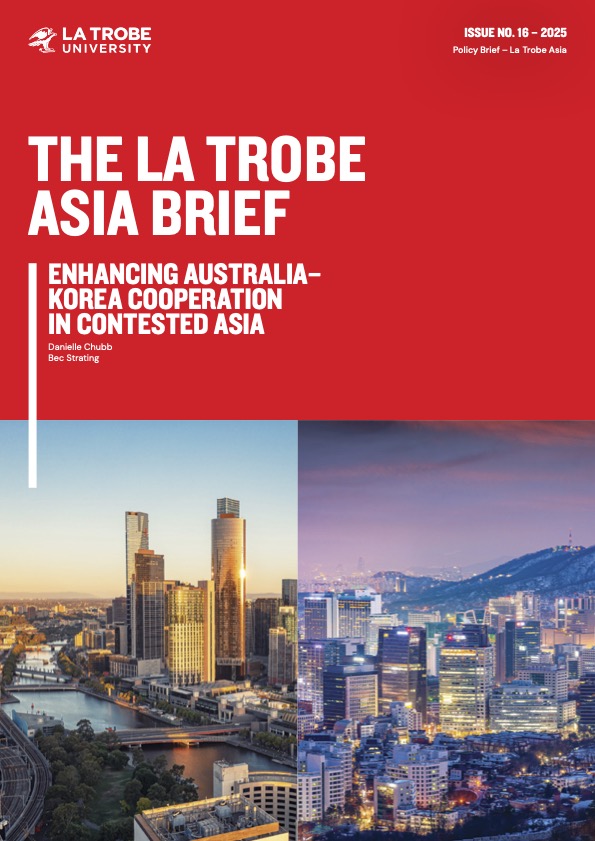 La Trobe Asia Brief # 16
La Trobe Asia Brief # 16
Enhancing Australia-Korea Cooperation in Contested Asia
Despite differing geographies and security pressures, Australia and the Republic of Korea face shared challenges arising from intensifying strategic competition and growing regional uncertainty. Both countries have an opportunity for a closer collaboration to promote regional stability and help shape a resilient multipolar order.
As their bilateral relationship deepens under the Comprehensive Strategic Partnership, this policy brief examines how Australia and Korea can move beyond defence-industrial cooperation to exercise meaningful middle-power agency. It identifies opportunities for collaboration in holistic security, highlights the delivery of regional public goods, and offers targeted recommendations to strengthen institutional cooperation and sustain long-term ambition in the Australia–Korea partnership.
Authors:
- Associate Professor Danielle Chubb (International Relations, Deakin University)
- Professor Bec Strating (Director, La Trobe Centre for Global Security)
Download a digital copy of the La Trobe Asia Brief #16 or contact us to request a free printed copy.
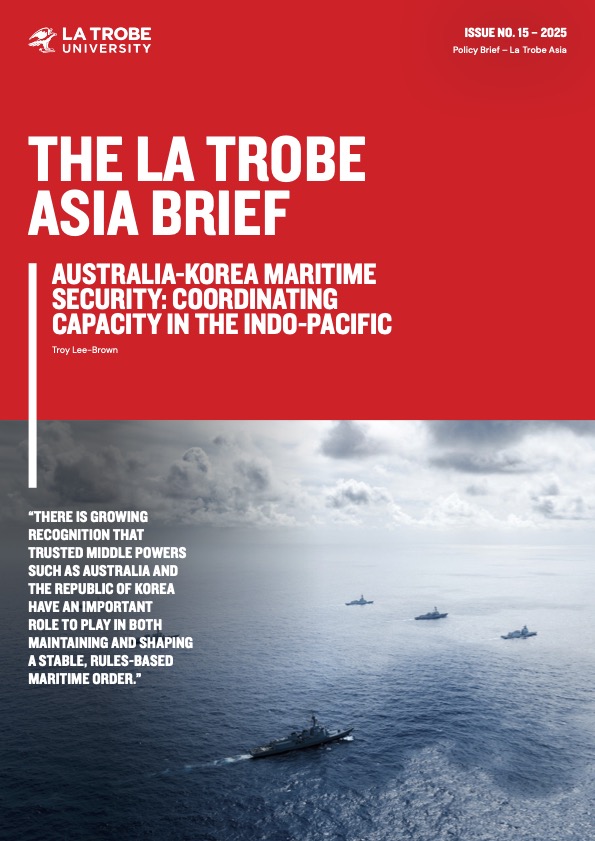 La Trobe Asia Brief # 15
La Trobe Asia Brief # 15
Australia-Korea Maritime Security: Coordinating Capacity in the Indo-Pacific
South Korea has unique security challenges when compared to many of its neighbours. Like many it lives in the shadow of giants like China and Russia, but the ever-present threat of North Korea is less than 50km from its capital, Seoul.
While its alliance with the United States remains important to Korea’s security and foreign policy outlook, there are many possibilities for stronger ties to allies and partners. This could present opportunities to enhance maritime security cooperation between Australia and Korea and with others in the region.
Lead Author: Dr Troy Lee-Brown (Research Fellow, Defence and Security Institute, University of Western Australia)
Download a digital copy of the La Trobe Asia Brief #15 or contact us to request a free printed copy.
 La Trobe Asia Brief # 14
La Trobe Asia Brief # 14
India-Australia Climate Resilience Partnership in the Pacific Islands
The 18 countries and territories across the Pacific are some of the most vulnerable to growing risks emerging from climate changes, especially the small island states.
Despite contributing less than 0.03% to global greenhouse gas emissions, the islands face devastating consequences, from sea level rise and loss of territory to unpredictable weather patterns to growing food and water insecurity.
India-Australia’s bilateral ties are at their strongest, presenting an opportune moment for more active collaboration to address food insecurity as an immediate concern and strengthen climate resilience in the Pacific Island region.
Author: Ambika Vishwanath (Principal Research Fellow, La Trobe Asia)
Download a digital copy of the La Trobe Asia Brief #14 or contact us to request a free printed copy.
 La Trobe Asia Brief # 13
La Trobe Asia Brief # 13
Defending the rule of law at sea
The 2016 Arbitral Tribunal Ruling on the South China Sea, under the United Nations Convention on the Law of the Sea (UNCLOS), remains a landmark decision in the field of international law. The ruling clarified the legal status of contested maritime features and waters, invalidating China’s claims to historic rights over most of the South China Sea.
Despite its legal significance, the ruling has faced substantial resistance from China, which has refused to accept or comply with the award. This policy brief examines the lessons learned from the ruling and explores strategies for advocating its enforcement through public and legal diplomacy, focusing particularly on the role countries like Australia can play in supporting the international rule of law in maritime governance.
Author: Associate Professor Lowell Bautista (School of Law, Western Sydney University)
Download a digital copy of the La Trobe Asia Brief #13 or contact us to request a free printed copy.
 La Trobe Asia Brief # 12
La Trobe Asia Brief # 12
The Philippines and the South China Sea Dispute
China claims rights to the islands and waters in the South China Sea, at times using military action to enforce the borders outlined by their 'nine-dash line'.
For more than a decade the Philippines have been using international legal mechanisms to challenge China's claims, with President Ferdinand Marcos signed Executive Order 57 on March 25, 2024, to deal with issues that impact the country’s national security, sovereignty, sovereign rights, and maritime jurisdiction over its extensive maritime zones.
This Brief presents an independent analysis of the 2016 Arbitral Ruling and its implications for the Philippines’ position in the South China Sea. It presents five key recommendations that the Philippines’ government may consider in its efforts to further strengthen its position in the South China Sea.
Author: Professor Amparo Pamela Fabe (National Police College and Philippine Public Safety College)
Download a digital copy of the La Trobe Asia Brief #12 or contact us to request a free printed copy.
 La Trobe Asia Brief # 11
La Trobe Asia Brief # 11
Vietnam's online platform workers
The rise of digital labour platforms has introduced a new paradigm in the way people work, offering a promising alternative to traditional employment in today’s digital era.
This emerging flexibility holds significant potential, particularly for individuals in developing countries such as Vietnam, where the rate of traditional informal employment remains notably high. However, achieving this potential may require government intervention and international cooperation.
Authors:
- Dr Yen Dan Tong (Sessional Lecturer, Economics, La Trobe University)
- Assoc Professor Le Dong Hau Pham (Lecturer, Economics, Can Tho University)
- Dr Julio Mancuso Tradenta (Lecturer, Economics, La Trobe University)
- Phuong-Duy Nguyen (Research Associate, Can Tho Institute)
- Nhu Y Nguyen (Talen Acquisition Specialist, PTN Global)
Download a digital copy of the La Trobe Asia Brief #11 or contact us to request a free printed copy.
 La Trobe Asia Brief # 10
La Trobe Asia Brief # 10
Enhancing global and regional maritime order
This Brief is a collaborative effort in which the authors examine critical issues facing maritime order in Asia.
A lack of a shared vision, differing interpretations of maritime order, and cooperation over security issues all create friction when using shared waterways across Asia, which makes fair and equitable access vital.
How can Asian states and allies can strengthen dialogue, interactions, and coordination to maximise the impact of their efforts in upholding regional and maritime order?
Authors: Bec Strating, Nick Bisley, Alessio Patalano, Hillary Briffa, Chisako T. Masao, Nobuhiro Aizawa, Yoichiro Sato, Kyoko Hatakeyama, Scott Edwards and Troy Lee-Brown
Download a digital copy of the La Trobe Asia Brief #10 or contact us to request a free printed copy.
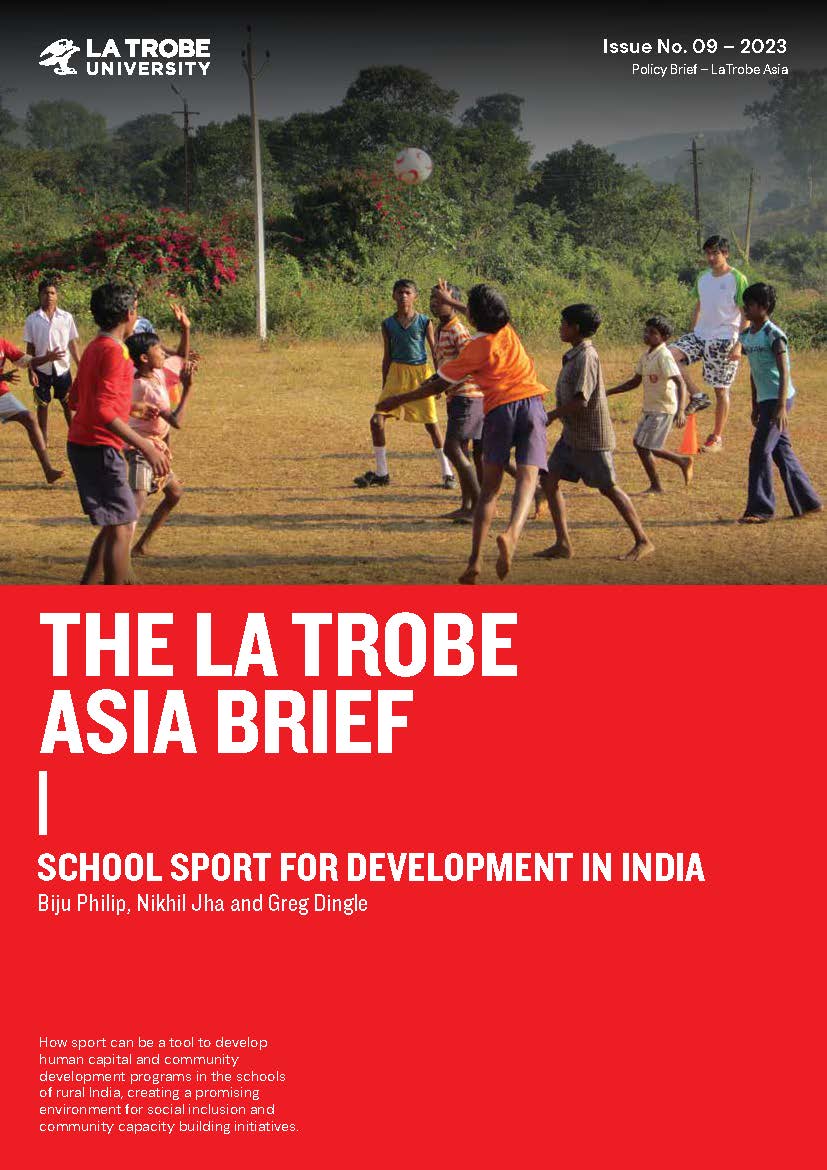 La Trobe Asia Brief # 9
La Trobe Asia Brief # 9
School sport for development in India
This Brief is a collaborative effort in which the authors examine the challenges and benefits sport programs within schools can provide to personal development and community cohesion in India.
India is a diverse country, both culturally and linguistically, and itsschool education system is enormous and challenging.
Policy makers and academics agree that school dropout rates and the quality of school education continue to be a challenge for educators in India, and the success of pilot programs reported in this issue demonstrate their effectiveness and possible applications in other countries, including Australia.
Authors: Biju Philip, Nikhil Jha and Greg Dingle
Download a digital copy of the La Trobe Asia Brief #9 [PDF 18KB] or contact us to request a free printed copy.
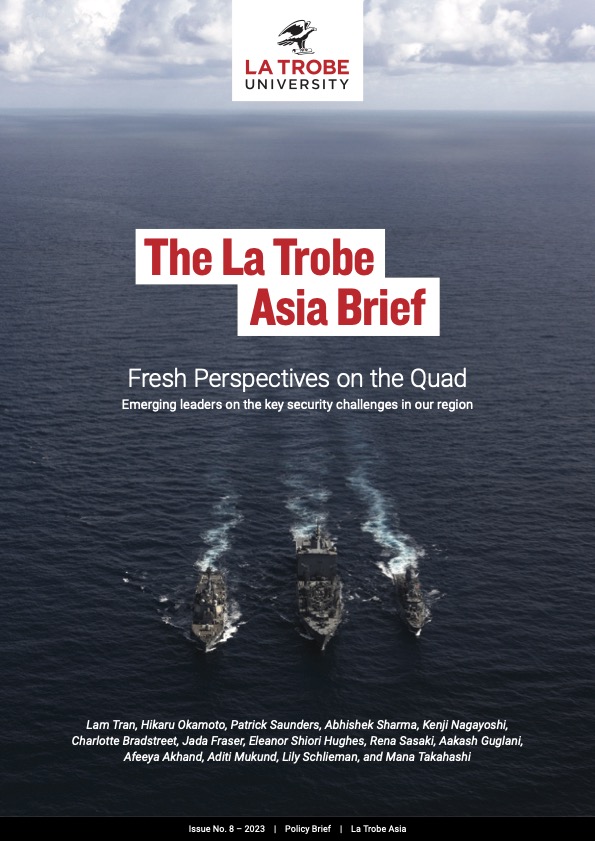 La Trobe Asia Brief # 8
La Trobe Asia Brief # 8
Fresh Perspectives on the Quad
In this edition, emerging leaders from Australia, Japan, India and the United States discuss key issues facing the 'Quad', and puts forward a strong case for the Quad working together on non-traditional security issues across the Indo-Pacific region.
The next generation of Quad leaders view enhancing resilience against grey zone challenges, geoeconomics, outer spaces, critical technologies and human security as keys to unlocking the Quad’s potential. This challenges the Quad to deliver on public goods commitments to strengthen the free and open Indo-Pacific.
This publication is the second instalment of the La Trobe Asia Emerging Leaders Program, funded and supported by the United States Embassy in Canberra.
Authors: Lam Tran, Hikaru Okamoto, Patrick Saunders, Abhishek Sharma, Kenji Nagayoshi, Charlotte Bradstreet, Jada Fraser, Eleanor Shiori Hughes, Rena Sasaki, Aakash Guglani, Afeeya Akhand, Aditi Mukund, Lily Schlieman, and Mana Takahashi
Download a digital copy of the La Trobe Asia Brief #8 [PDF 6MB] or contact us to request a free printed copy.
 La Trobe Asia Brief # 7
La Trobe Asia Brief # 7
Indigenous Language Rights and the Politics of Fear in Asia
The United Nations has declared 2022 the start of the International Decade of Indigenous Languages. This decade aims to raise awareness of the ongoing global loss of Indigenous languages and to initiate effective action in defense of Indigenous languages.
However, ongoing attacks on human rights defenders and restrictions on civil society present critical challenges, creating a politics of fear that suppresses action in defense of Indigenous languages and undermines the effectiveness of the Decade.
Authors:
- Dr Gerald Roche (Senior Research Fellow, Politics, La Trobe University)
- Associate Professor Madoka Hammine (International Studies, Meio University)
- Associate Professor Tuting Hernandez (Department of Linguistics, University of the Philippines)
Download a digital copy of the La Trobe Asia Brief #7 [PDF 2 MB] or contact us to request a free printed copy.
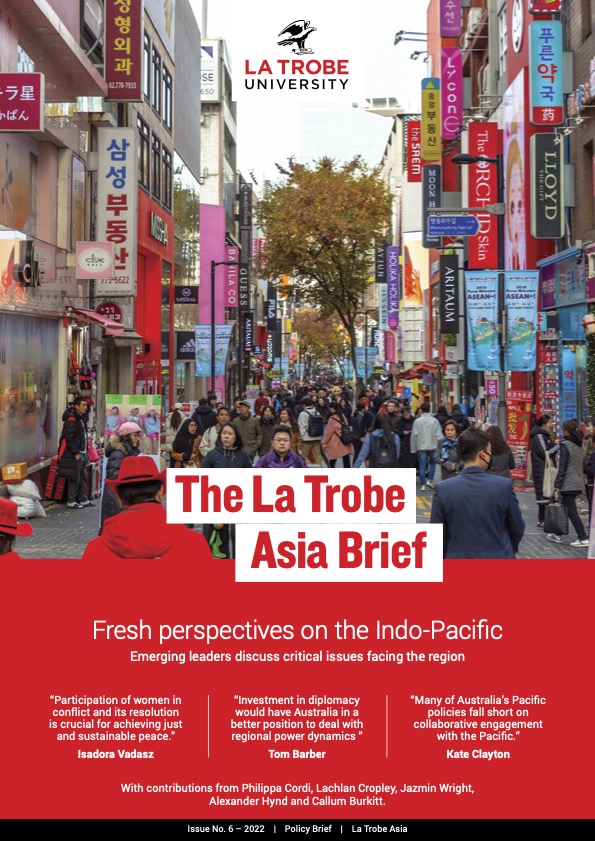 La Trobe Asia Brief # 6
La Trobe Asia Brief # 6
Fresh Perspectives on the Indo-Pacific
This edition features articles by Australia’s emerging leaders in foreign, defence and strategic policy. It is a showcase of the issues that they consider most pressing in the Indo-Pacific and potential solutions for addressing these challenges.
The publication is a product of La Trobe Asia’s Emerging Leaders Program held in the second half of 2021. This program – featuring an academic dialogue and a series of masterclasses on the Indo-Pacific – was supported by the United States Embassy in Canberra, and we are grateful to the US Department of State for funding this program.
Authors:
- Isadora Vadasz (Victorian Department of Justice and Community Safety)
- Callum Burkitt (Bachelor of International Relations student at La Trobe University)
- Alexander M Hynd (PhD candidate at the University of NSW)
- Kate Clayton (Research Officer at La Trobe Asia)
- Philippa Cordi (Analyst at the Australian Government Department of the Treasury)
- Jazmin Wright (Bachelor of of Security Studies student at Macquarie University)
- Lachlan Cropley (Education Facilitator at Australia-Indonesia Youth Association)
- Tom Barber (Program Officer with the Asia-Pacific Development, Diplomacy & Defence Dialogue (AP4D)
Download a digital copy of the La Trobe Asia Brief #6 [PDF 2 MB] or contact us to request a free printed copy.
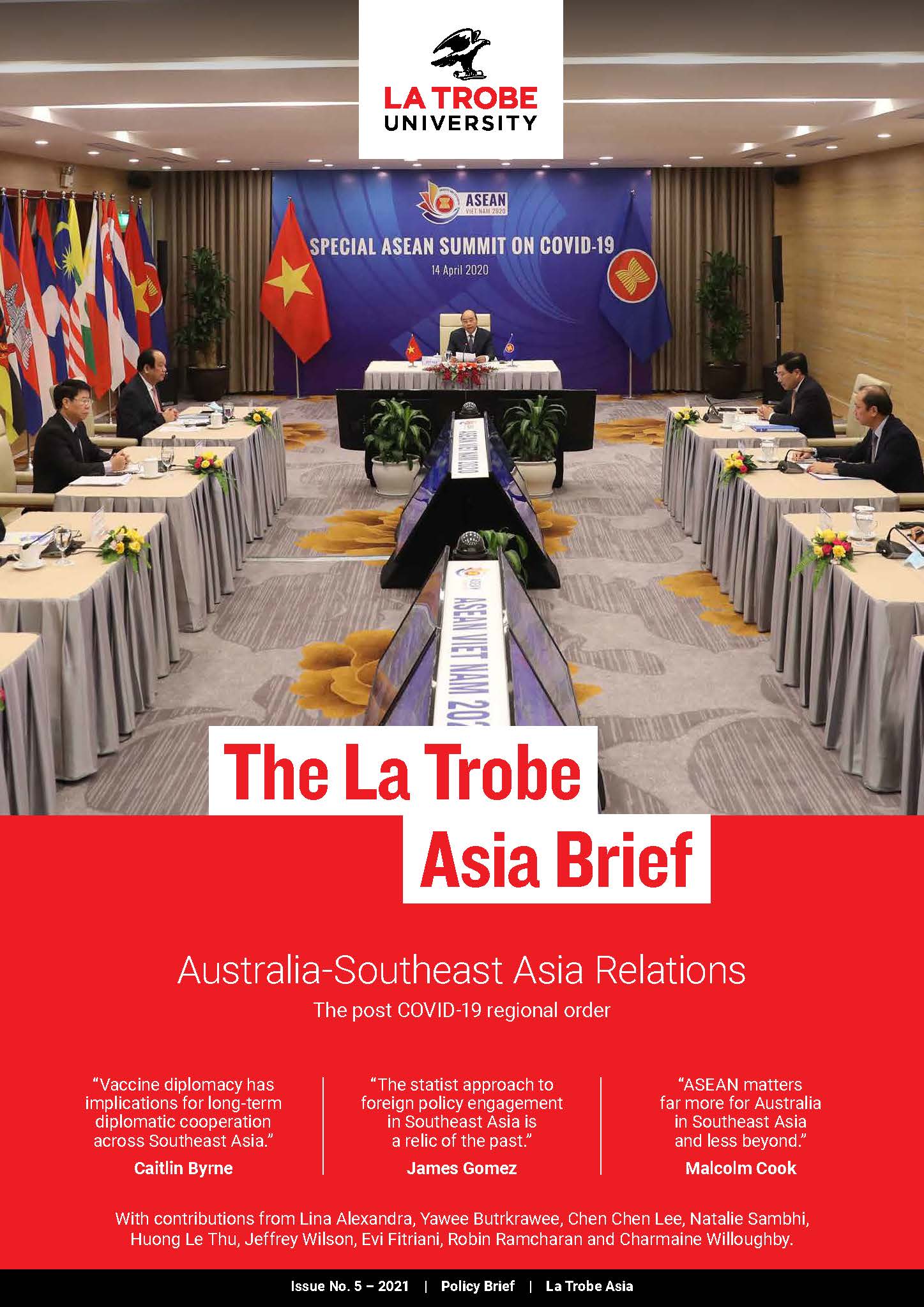 La Trobe Asia Brief # 5
La Trobe Asia Brief # 5
Australia-Southeast Asia Relations: The Post COVID-19 Regional Order
The relationship between Australia and Southeast Asian countries has grown substantially in the last decade, from a marriage of convenience to the development of regional agendas, strategic partnerships and shared economic interests.
A global pandemic has shifted priorities, and vaccine diplomacy throughout the region has altered and strengthened existing allegiances. Has Australia's actions during the pandemic helped or hindered relationships with Southeast Asian nations? What will the post-COVID-19 regional order of Southeast Asia look like?
La Trobe Asia examines this increasingly complex topic in its latest La Trobe Asia Brief - Australia-Southeast Asia Relations: The Post COVID-19 Regional Order.
The publication comprises a series of opinion pieces, published with a creative commons license, examining the relationship between the Australia and Southeast Asia by twelve highly-respected experts with diverse views from across the region.
This publication is a product of a fruitful online academic dialogue held in February 2021 in collaboration between La Trobe Asia, Asia Centre, Centre for Strategic and International Studies Indonesia, Institute of Strategic and International Studies Malaysia, Griffith Asia Institute, Asialink, Perth US-Asia Centre and Generate Worldwide. It was proudly supported by the Australia-ASEAN council.
It makes a timely and valuable contribution to an increasingly polarised topic, and should serve as a valuable resource for policymakers, scholars and members of the public.
Authors:
- Lina Alexandra (Senior Researcher, Centre of Strategic and International Studies (CSIS) Indonesia)
- Dr Jeffrey Wilson (Research Director, Perth USAsia Centre)
- Professor Caitlin Byrne (Director,Griffith Asia Institute, Griffith University)
- James Gomez (Regional Director, Asia Centre) and Robin Ramcharan (Executive-Director, Asia Centre)
- Malcolm Cook (Visiting Senior Fellow, ISEAS-Yusof Ishak Institute)
- Huong Le Thu (Senior Analyst, The Australian Strategic Policy Institute)
- Chen Chen Lee (Diplomacy Adviser, Asialink) and Catherine Hooton (Intern, Asialink)
- Yawee Butrkrawee (Program Coordinator, Asia Centre)
- Charmaine Misalucha-Willoughby (Associate Professor of International Studies, De La Salle University, Manila)
- Dr Evi Fitriani (Associate Professor of International Relations, Universitas Indonesia)
- Natalie Sambhi (Executive Director, Verve Research)
Download a digital copy of the La Trobe Asia Brief #5 [PDF 1.8 MB] or contact us to request a free printed copy.
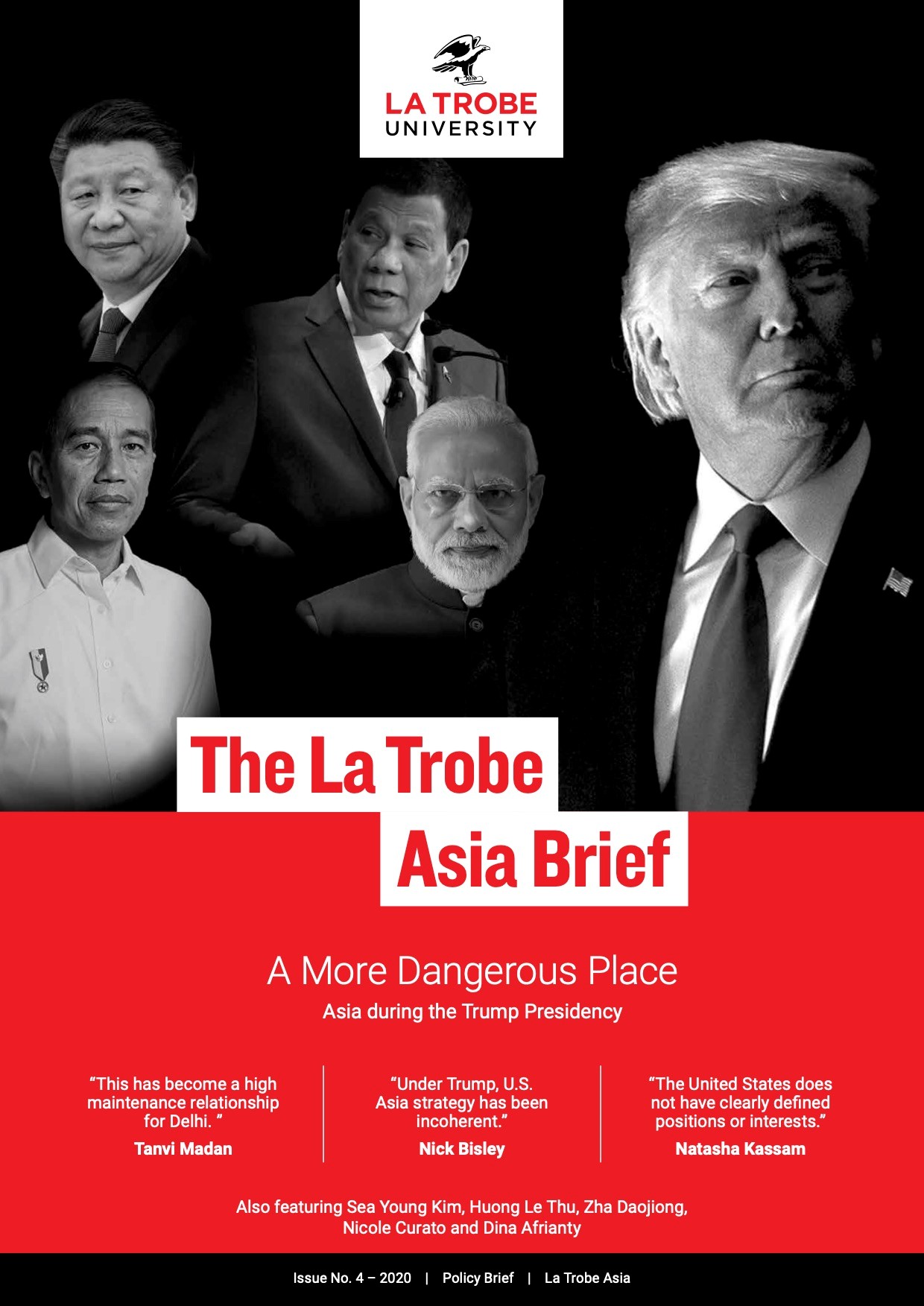 La Trobe Asia Brief # 4
La Trobe Asia Brief # 4
A More Dangerous Place: Asia during the Trump Presidency
Donald J. Trump’s win in the 2016 US elections was met with mixed emotions across Asia. Many in the region greeted the election with cautious optimism. They assumed that Washington would take a more pragmatic line, and that a man who prided himself on his business acumen would present new opportunities in trade and resource relations.
But the Trump presidency has proven to be unpredictable. His relationship with Asian countries has been wide-ranging, from flattering to negligent, and competition among the major powers, particularly between China and the United States, has intensified and is now the dominant feature of the region’s international relations.
La Trobe Asia will explore this increasingly complex topic in its latest La Trobe Asia Brief - A More Dangerous Place: Trump in Asia.
The publication comprises a series of opinion pieces, published with a creative commons license, examining the relationship between the United States and Asia by eight, highly-respected experts with diverse views from across the region.
It makes a timely and valuable contribution to America's increasingly polarised relationship with Asia, and should serve as a valuable resource for policymakers, scholars and members of the public
Authors:
- Professor Nick Bisley (Dean of the School of Humanities and Social Sciences, La Trobe University)
- Natasha Kassam (Research Fellow, Diplomacy and Public Opinion Program, Lowy Institute)
- Sea Young Kim (Research Associate, East Asia Institute)
- Dr Huong Le Thu (Senior Analyst, Defence & Strategy Program, Australian Strategic Policy Institute)
- Professor Zha Daojiong (School of International Studies, Peking University)
- Associate Professor Nicole Curato (Centre for Deliberative Democracy and Global Governance, University of Canberra)
- Dr Dina Afrianty (Research Fellow, La Trobe Law School, La Trobe University)
- Tanvi Madan (Director, The India Project, The Brookings Institution)
Download a digital copy of the La Trobe Asia Brief #4 [PDF 1 MB] or contact us to request a free printed copy.
 La Trobe Asia Brief # 3
La Trobe Asia Brief # 3
Melting Opportunities: Managing climate change and conflict in the Himalaya
The ice-capped peaks of the Himalaya are instantly recognisable and play a critical role in Asia's climate, hydrology, ecology and geopolitics. The mountains are home to more than 150 threatened species, and 3 biodiversity hotspots. The rivers that flow from them support nearly half the world’s human population and twenty per cent of its economy.
The mountains are also the site of international border disputes, ethnic unrest, competitive development and ongoing environmental and cultural destruction.
In issue 3 of the La Trobe Asia Brief, the authors examine the problem of climate and conflict in the Himalaya, and the implications it has for resources and security across Asia.
In order to avoid an environmental catastrophe that will impact much of Asia, the authors recommend:
- Militaries in the Himalaya abide by strict environmental protocols and work towards demilitarisation.
- Indigenous communities be given a greater advisory role in regional governance.
- Language revitalisation programs are implemented and local place names are used.
- ICIMOD (International Centre for Integrated Mountain Development) is funded and supported at a higher level by both its member states and internationally.
- Linkages and supports are encouraged between Himalaya governance institutions and those in the Arctic and Antarctic.
- The UN’s Clean Development Mechanism removes its support from large hydropower projects built near fault lines and ice packs in the Himalaya.
Authors:
- Dr Alexander E. Davis (New Generation Network Research Fellow, Politics, La Trobe University)
- Dr Ruth Gamble (David Myers Research Fellow, La Trobe University)
- Dr Sonika Gupta (Chinese Studies and Global Politics, Indian Institute of Technology Madras)
- Dr Anwesha Dutta (Post Doctoral Research Felllow, Chr. Michelsen Institute, Bergen, Norway)
- Dr Gerald Roche (Research Fellow, Politics, Media and Philosophy, La Trobe University)
Download a digital copy of the La Trobe Asia Brief #3 [PDF 1 MB] or contact us to request a free printed copy.
 La Trobe Asia Brief # 2
La Trobe Asia Brief # 2
Australia-China Relations: Finding the elusive balance
The relationship with China is of critical importance to Australia. It is also increasingly complex, being influenced by economics, domestic factors and strategic forces.
Yet it is a relationship with underlying tension. China and Australia sometimes find themselves on different sides of the table in some bilateral issues, and disagreements over foreign investment in Australia, influence, and the interests of allied countries might prevent further successful co-operation or interaction.
This increasingly complex topic is explored through a series of opinion pieces, published with a creative commons license, examining the Australia-China relationship by eight, highly-respected experts with diverse views from both Australia and China.
The second La Trobe Asia Brief makes a timely and valuable contribution to Australia’s sometimes polarised China debate, and should serve as a valuable resource for policymakers, scholars and members of the public.
Authors:
- Emeritus Professor Hugh White (Strategic and Defence Studies Centre, Australian National University)
- Dr Rebecca Strating (Senior Lecturer, Politics, La Trobe University)
- Professor Chen Hong (Director, Australian Studies Centre, East China Normal University)
- Dr Euan Graham (Executive Director, La Trobe Asia, La Trobe University)
- Dr Hu Dan (Deputy Director, Australian Studies Centre, Beijing Foreign Studies University)
- Professor Nick Bisley (Head of School of Humanities and Social Sciences, La Trobe University)
- Rowan Callick (Journalist, author, advisory board member, La Trobe Asia)
- Professor John Fitzgerald (Centre for Social Impact, Swinburne University of Technology)
Download a digital copy of the La Trobe Asia Brief #2 [PDF 3.8MB] or contact us to request a free printed copy.
 La Trobe Asia Brief # 1
La Trobe Asia Brief # 1
Cooperation in Contested Asia: How Japan and Australia can shape the region's changing security dynamic
East Asia’s security environment is changing rapidly. China’s power and confidence is rising, the US is increasingly introspective and uncertainty abounds about its power and purpose. India and Russia also clamour for influence. Regional powers are entering a period of growing rivalry and animosity, nationalism is an increasingly pervasive force, and prompted by a pervasive sense of strategic uncertainty, military spending is ramping up in many countries.
As a new equilibrium has yet to be established in the security order, how can middle ranking countries like Japan and Australia manage their interests? The two countries have developed a close and cooperative security partnership since 2007. The changing environment is challenging but they can better navigate it by working together in a closely coordinated manner involving both diplomatic and security policy tools.
This La Trobe Asia Brief explains how Australia and Japan can work collaboratively to advance their shared interests in a dynamic regional order. It is based on discussions held at an experts’ workshop that was convened in Fukuoka, Japan, co-hosted by La Trobe University and Kyushu University and generously supported by the Australia-Japan Foundation.
In managing this increasingly unsettled security environment, this policy brief recommends Australia and Japan should:
- Coordinate their dual hedging strategy to help bind the US to the region while simultaneously planning for a reduced and less reliable long term US role;
- Form interest-driven minilateral coalitions to advance the capacity of regional powers to shape their security environment;
- Work together in institutional forums, both new and old, to advance their shared interests. In particular, they should coordinate their engagement with China’s Belt and Road Initiative (BRI);
- Diversify their diplomatic and economic relations to become less dependent on the two dominant powers;
- Ensure their ‘rules-based order’ discourse matches their policy reality.
- Associate Professor Nobuhiro Aizawa (Department of Social and Cultural Studies, Kyushu University)
- Professor Nick Bisley (Head of School of Humanities and Social Sciences, La Trobe University)
- Associate Professor Chisako Masuo (Graduate School of Social and Cultural Studies, Kyushu University)
- Dr Rebecca Strating (Department of Politics, Media and Philosophy, La Trobe University)
Download a digital copy of the La Trobe Asia Brief #1 [PDF 1.75MB] or contact us to request a free printed copy.
